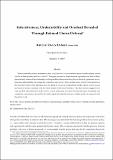Indecisiveness, undesirability and overload revealed through rational choice deferral
Abstract
Three reasons why decision makers may defer choice are indecisiveness between various feasible options, unattractiveness of these options, and choice overload. This paper provides a choice-theoretic explanation for each of these phenomena by means of three deferral-permitting models of decision making that are driven by preference incompleteness, undesirability and complexity constraints, respectively. These models feature rational choice deferral in the sense that whenever the individual does not defer, he chooses a most preferred feasible option. Active choices are therefore always consistent with the Weak Axiom of Revealed Preference. The three models suggest novel ways in which observable data can be used to recover preferences as well as their indecisiveness, desirability and complexity components or thresholds. Several examples illustrate the relevance of these models for empirical and theoretical work.
Citation
Gerasimou , G 2018 , ' Indecisiveness, undesirability and overload revealed through rational choice deferral ' , The Economic Journal , vol. 128 , no. 614 , pp. 2450-2479 . https://doi.org/10.1111/ecoj.12500
Publication
The Economic Journal
Status
Peer reviewed
ISSN
0013-0133Type
Journal article
Collections
Items in the St Andrews Research Repository are protected by copyright, with all rights reserved, unless otherwise indicated.

